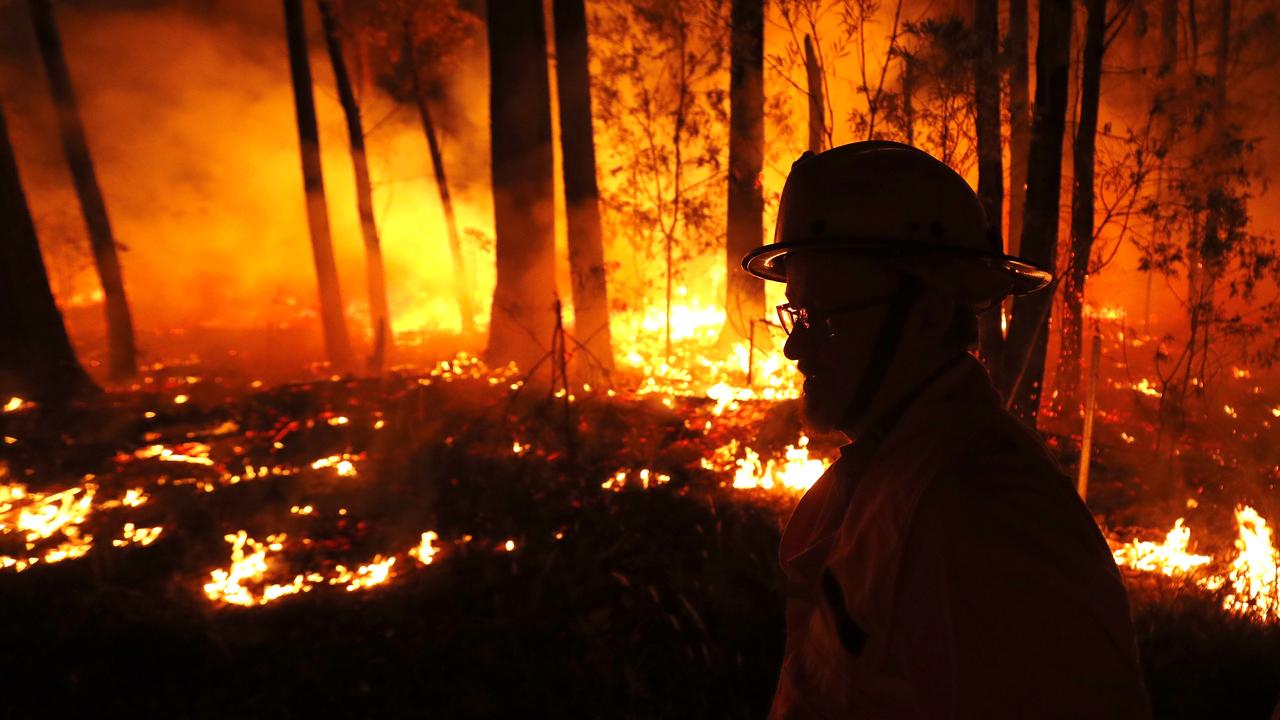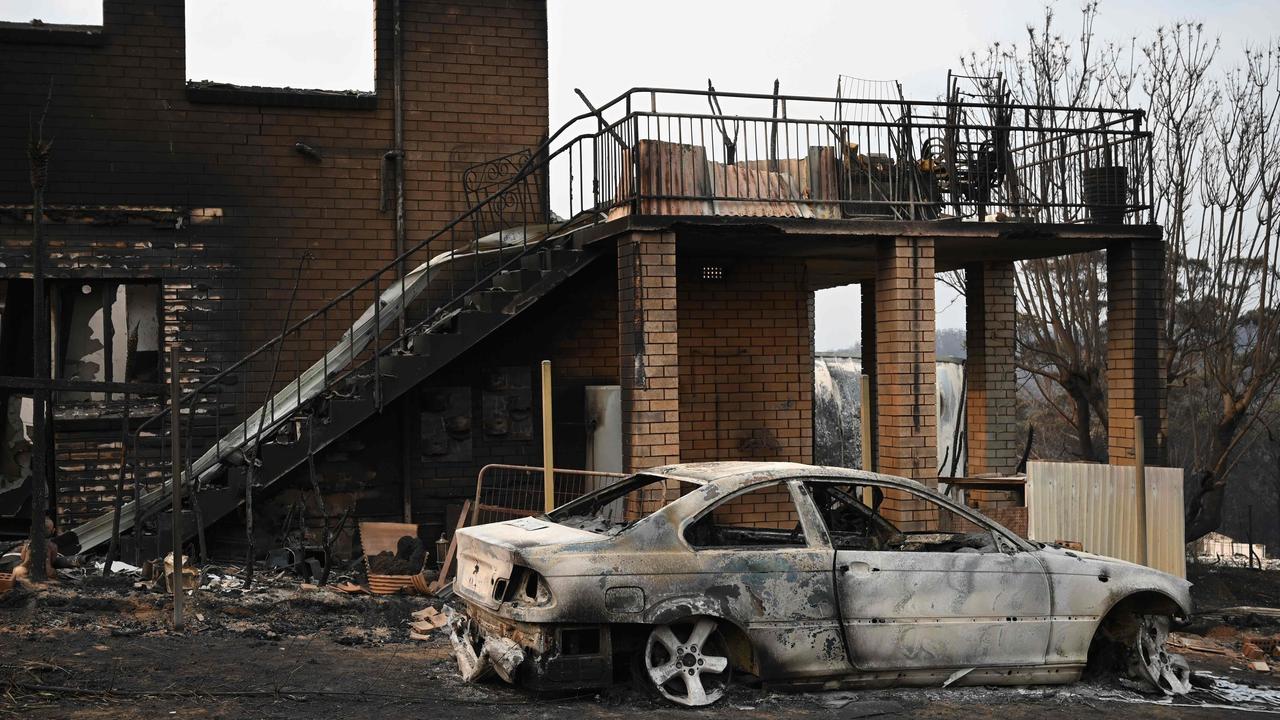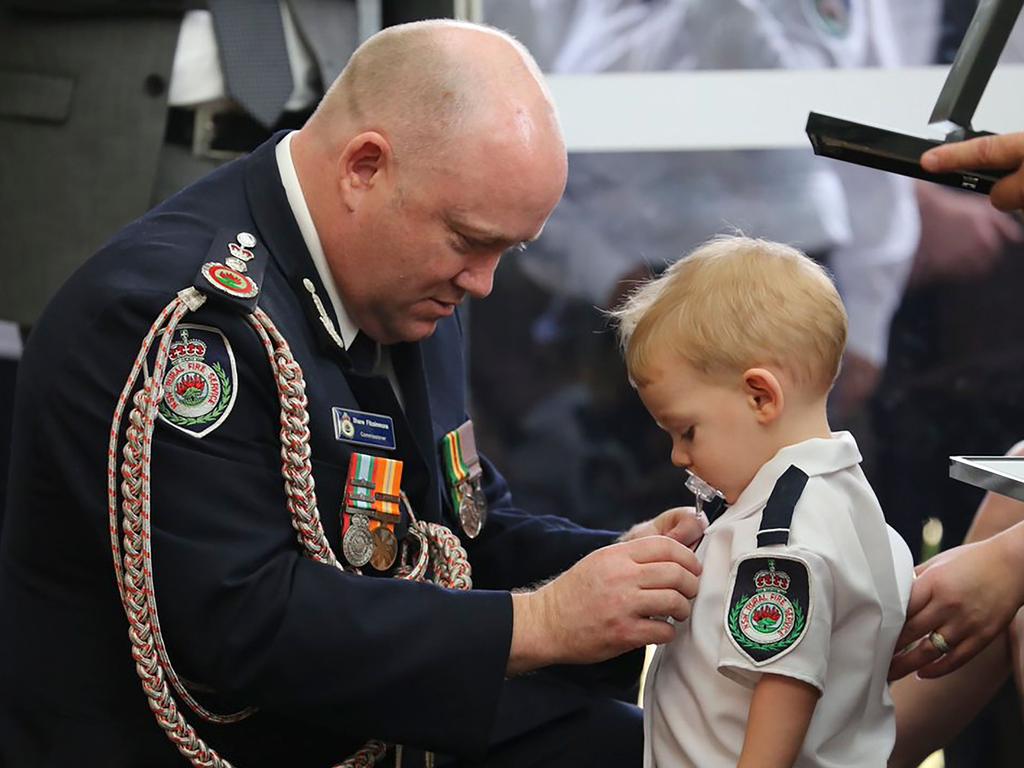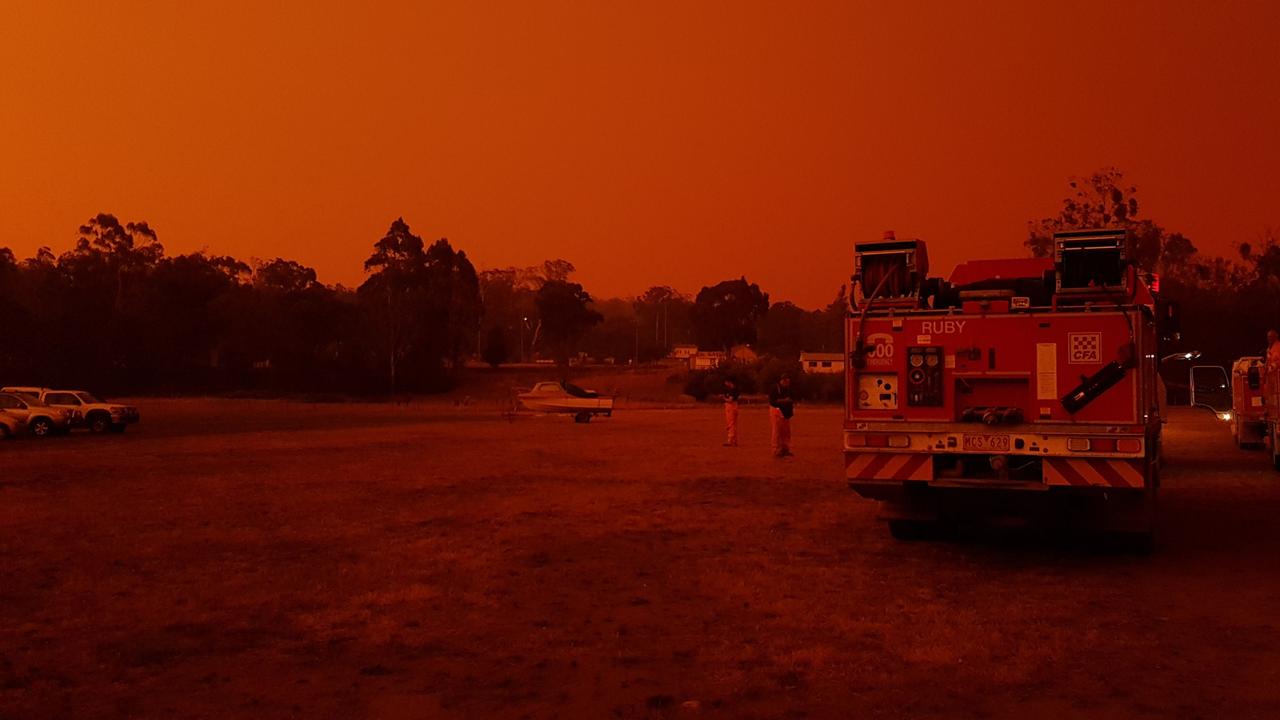Bushfires prove again firefighters are the best of us
As our normal summer is upturned by the raging bushfires, people are looking to our new heroes.

The children, aged between three and 10, wore face masks — now called smoke masks — to keep the ash from their lungs.
Good kids, they stayed so calm.
The boat’s owner, Brett Cripps, 51, could do nothing other than sit beside them, watching as his house by the NSW south coast shoreline burned to the ground. Life as he has always known it is now over. He’ll have to rebuild somehow, but he saved the lives of 11 people he found sheltering by the wharf.
“Because I had to,” he said, when rushed by the media. “What else can you do?”
That was just one story, emerging like a diamond from this week’s fires.
It has been so hard out there this summer. Fires are burning across the country. People have died, among them volunteers who offered to stand between man and this raging beast.
We mourn them.
Hundreds of thousands of people have been caught up in the catastrophe. Displaced from homes and from holiday accommodation, they have sheltered on beaches, the bewildered kids still holding their pool noodles. They had no food, no water, no nappies, no petrol, no telecommunications.
They should have been doing as we mostly all do in January: escaping the city by heading up the coast, or down to the river, being barefoot, and licking ice-cream off our forearms.
Too many have instead known only misery and fear.
An evacuation order was issued for the entire Kosciuszko National Park — towns, resorts, everyone out! — and the beach at the NSW south coast hamlet of Malua Bay, normally so sweet and sleepy, has been crowded with people squinting into the smoke.
It’s difficult to draw solace but Australians have, in the main, been good to each other.
There will be many articles this weekend about loss and sorrow. This is about the ways in which we coped.
We start with the story of Ron Coote. He won’t be well-known outside Sydney, but he used to be a handy rugby league player. He’s 75, and he has been living for 35 years up near Lake Conjola.
He saw the fires coming and for a nanosecond wondered if he might try to save the place using a garden house and water from the swimming pool.
He told his wife, Robin, also 75, and their daughter, and some friends they had staying. Because that, too, is the season we’re supposed to be in — the season where you’re staying, or else you’ve got friends staying and the sofa bed’s out, and you’re firing up the barbecue and keeping an eye on the cricket, and the bin lids. But instead he was telling them to make a break for the lake.
Fire came rushing up behind them, licking its way up the saplings along the water’s edge.
Robin jumped in the lake. What else was she supposed to do, as flames came flying up the trees? She was trying to get to the other side — swimming, and dog-paddling, or else just treading water — and she’d been doing it for an hour when a stranger on a jet ski came and plucked her up.
You’re okay, love.
“She’s one tough hombre,” Ron marvelled to reporters.
They lost the house. When he woke the next day, the first thing that occurred to him was he had no clothes to put on.
“We used to get up and go to the drawer to put something on and away you’d go,” he told the Nine Network, but such a simple and ordinary thing was no longer possible. He couldn’t leave, he had no petrol, and the car was gone anyway. But they’re alive.
Not everyone was so lucky. Three bodies have been found in the Lake Conjola area. It’s a small, tight-knit community. There’s nobody that isn’t known to everyone else.

Also lost this week: 67-year-old Mick Roberts, who had been at home in Buchan, in Victoria’s East Gippsland region, painting with two friends when the fire came.
They ran into the river. He said he needed to go into the shed for a minute, and his family never saw him again.
“He believed you don’t run away from anything,” said his niece, Leah Parson.
You couldn’t run from this one. You had to get out early. Not everyone managed it.
The first firefighter funeral was held this week: Jess Hayes, and her son, Harvey, buried the man they loved, Rural Fire Service firefighter Geoffrey Keaton.
He was killed in Buxton, southwest of Sydney, on December 19.
His family had to get through Christmas and the New Year without him — how? — and then lay his helmet on a boulder in a memorial garden. Again, how? TV cameras lingered on the mug with child’s writing — “Daddy, I love you to the moon and back” — and on 19-month-old Harvey, standing with his back straight in his pint-sized uniform, sucking hard on the dummy in his mouth. How?

There was a guard of honour for Keaton: men and women in boots and yellow jackets, some still with ash in their pockets. How do we repay these people?
They gave it a good go at the Sydney Cricket Ground yesterday, with the crowd asked to applaud those “who are working so hard to keep us safe”. Thousands stood as a single firefighter strode out towards the centre.
How he held it together as the applause rang out and then kept ringing around the ground … well, that’s anyone’s guess, but he did. The chin twitched, but he did.
Players wore black armbands to honour the dead. Australia coach Justin Langer gave his cap to an 80-year-old in a wheelchair who had just dodged the fire outside Lithgow.
Brisbane Heat batsman Chris Lynn has offered to donate $250 for every six he hits during the Big Bash, so that’s $3000 already, “for the real heroes, fighting to save lives”.
Commentator Glenn Maxwell got on board: “Love it, Lynny. I’ll match you. Great cause, which is helping so many people doing it tough right now.” We are all in this together, in part because the world has changed.
The mobile phone means we can now see fires from the perspective of those who fight them. How fast it moves, how terrifying it can be when it spreads like … well, you know, wildfire.
It spreads across the media, too, in the way it didn’t, before Facebook and Instagram, and Twitter. Some of this week’s images, we will never forget:
A long-haired little boy steering his family to safety in a tinny, beneath an orange sky.
A kangaroo in silhouette, leaping through the embers in front of a burning house.
A timber house, with a sign out the front: “Evacuees knock for food or shower, tent sites or dog minding help in general.”
Another on a nearby shop: FREE FOOD.
Four thousand people trapped in the Victorian coastal town of Mallacoota, waiting to be evacuated by a navy ship.
Local fishing boats giving up diesel to power the generator at Woolies in Ulladulla, so the milk in the fridge didn’t spoil. The Caltex sign on the highway: NO PETROL.
The long queues at local phone boxes in holiday resorts, with people keeping their call times down to five minutes, so everyone could get a go.
Holidaymakers sleeping in their cars by the side of the road; kids using beach towels as blankets while gas cylinders from backyard barbecues exploded in the distance.
Empty fairgrounds.
The hall at Mallacoota, filled to bursting with people in smoke masks.
Parents holding children, trying to decide whether to get on board the emergency craft, or to wait it out somehow.
But how? There was nowhere to stay, and nowhere else to go. HMAS Choules can take only 1000 people at a time, and its planned voyage to Hastings on the Mornington Peninsula takes 17 hours. There are only a few hundred beds, and you must be able to negotiate ladders and stairs.
NSW Transport Minister Andrew Constance, who lives in Malua Bay south of Batemans Bay, wept as he told reporters that yes, his home had been saved, but several neighbours’ homes were gone.
“The RFS have been deadset about this, it is dangerous,’’ Constance said.
“We have a lot of active fires, big fires, unprecedented fires.
“It’s unfair … I met four RFS guys yesterday who lost their homes. Beautiful neighbours of mine who lost their homes … we will get through together … people have been through a lot, we’ll recover it, but it’s just hard.”
At the Sydney Harbour fireworks on Tuesday night, volunteers were going around with white buckets, collecting money for the relief efforts, and the people in the crowd couldn’t get their hands into and out of their pockets fast enough.
Give to the fireys? Oh, you bet. Absolutely. Because where would we have been without them, this past week? And going forward? There is talk of a ticker-tape parade, when this is done. Line the streets and get your banners ready. They’re the best of us.





Seven adults, seven children and two dogs, all aboard a boat built for six. For three hours, they bobbed on the water, in the centre of Lake Conjola. It was midday but the sky overhead was black, and the lake was ringed by fire.